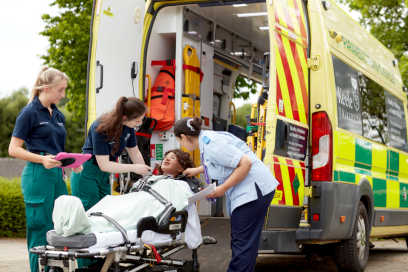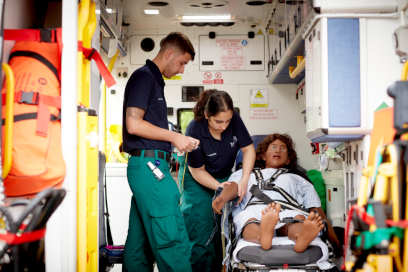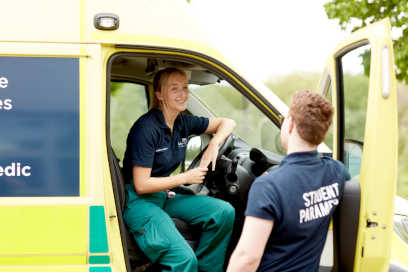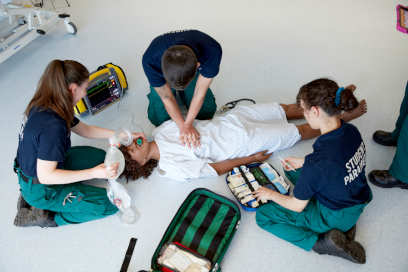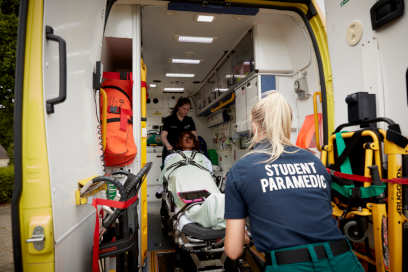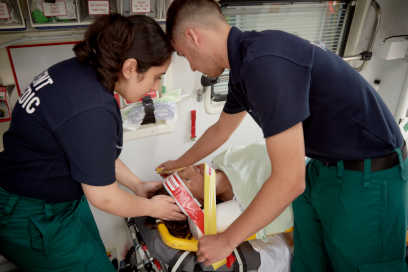
Paramedic Science - MSc
Embark on a rewarding and challenging career in paramedic science and make a meaningful impact on the lives of others. Build on the knowledge and skills from your health or biomedical undergraduate degree to unlock your potential and become a compassionate and resilient paramedic. Our Paramedic Science MSc programme prepares you to meet the challenges of fast-paced healthcare environments, equipping you with the clinical expertise, practical experience, and confidence needed to deliver exceptional care to individuals at their most critical moments.
Month of entry
- September
Mode of study
- Full time
Fees for 2025/26 academic year
UK Full Time - £9,535 per year*
International - £20,200 per year.
Duration of study
- 2 years full time
Why study Paramedic Science at Keele University?
Course summary
Keele's Paramedic Science MSc is designed for individuals with a health or biomedical undergraduate degree who are ready to take the next step toward a career in paramedicine. The programme will nurture your development into a highly skilled paramedic who is equipped to work at the forefront of emergency, urgent, primary and community-based care. Career potential extends beyond the ambulance service with opportunities for you to undertake roles in leadership, management or research.
To develop your professional paramedic skills our curriculum integrates theory, clinical practice and simulation. You’ll undertake practice-based learning on placements within the health service, including the ambulance service, intensive care, walk-in centres, social care settings and emergency departments. These placements will enhance your clinical skills, allowing you to deliver high quality care, excellent patient experience and ensuring you meet the Health and Care Professions Council standards of proficiency for paramedics.
Reflecting the dynamic nature of the healthcare environment, our multidisciplinary programme supports collaboration with other healthcare professionals including doctors, midwives, nurses, pharmacists, physiotherapists and radiographers. This fosters your critical thinking, decision-making, problem-solving and communication skills, and builds the confidence and adaptability required to navigate complex and unpredictable settings.
Clinical skills workshops will allow you to practice specific paramedicine skills under the guidance of experienced clinical professionals. You will also advance your knowledge of human anatomy and physiology, human disease, palliative care, obstetric and gynaecological conditions, pathophysiology, pharmacological and non-pharmacology treatments. Leadership and management theories are also explored to develop your understanding of the importance of clinical leadership within paramedic practice. You’ll also use the latest technology for remote patient assessment and care and deepen your understanding of the importance of data in effective healthcare decision-making.
Next steps
Course structure
Modules
The module details given below are indicative, they are intended to provide you with an idea of the range of subjects that are taught to our current students. The modules that will be available for you to study in future years are prone to change as we regularly review our teaching to ensure that it is up-to-date and informed by the latest research and teaching methods, as well as student voice. The information presented is therefore not intended to be construed and/or relied upon as a definitive list of the modules available in any given year.
Year one
PAR-40071 Research & Evidence-Informed Practice
The Research and Evidence-Informed Practice module will afford you the underpinning theory to develop knowledge and comprehensive understanding of research methodologies and the role of evidence-based practice applicable to healthcare and contemporary paramedic practice. The process of change management and the notion of service improvement is explored. It will combine a mixture of lecture presentations, smaller group tutorials, personal reading, and personal reflective exercises in order to increase your research mindedness and confidence in your skills to improve clinical practice.
PAR-40073 Pathophysiology and Pharmacology for Paramedics
The Pathophysiology and Pharmacology for Paramedics module will develop knowledge gained from previous studies as an undergraduate student and explore in-depth human anatomy, physiology and pathophysiology. The module provides students with knowledge and understanding of disease processes and pathological changes in response to illnesses and injuries encountered in paramedic practice. State of the art facilities and expert academic and scientific staff will use a blended and problem-based learning approach to develop your knowledge and understanding.
PAR-40069 Principles of Paramedic Practice - LEVEL 7
This module will enable the student to build on their previous experiences from undergraduate study and employment to develop their knowledge, skills, and understanding of a range of assessment techniques and clinical skills/interventions within the scope of practice for a paramedic. Relevant legislation, professional and regulatory standards will be covered in addition to an overview of key local and national public health challenges in emergency and urgent care.
PAR-400081 Applied Practice & Simulation for Paramedics 1
The Applied Practice and Simulation for Paramedics 1 module provides you the means to apply theory into practice. Under the supervision you will develop clinical decision-making skills and formulate and deliver care management plans utilising clinical skills to provide care to service users in the clinical practice environment. You will experience the delivery of unscheduled, emergency, and urgent care, during your placements. You will also undertake authentic clinical simulation in state-of-the-art simulation facilities across campus and sites.
Year two
PAR-40057 Clinical Leadership for Paramedics
This module has been designed to develop leadership knowledge, skills, qualities and behaviours for student paramedics and seeks to develop, nurture and enhance existing team working skills and clinical leadership requirements. Leadership theories and models are appraised and applied to the clinician's work context, with the aim of improving their leadership potential and abilities to lead and deliver high-quality health care in their field of practice, with a focus on the service user experience.
PAR-40053 – Advancing Practice Project
This module will form the structure for an advancing practice project for the final year of the MSci Paramedic Science and MSc Paramedic Science programmes. This module is specifically structured to take into account a number of factors affecting service delivery and service improvement to embody an emphasis on the student to identify, plan and propose delivery and reflect upon a service improvement (advancement) project.
PAR-40079 Behavioural Health for Paramedics – LEVEL 7
The Behavioural Health for Paramedics module aims to provide students with comprehensive knowledge and critical understanding of subject areas synonymous with behavioural health. An in-depth and critical analysis of healthcare legislation, ethical principles and professionalism, with a focus on mental health, multidisciplinary and multiagency working will nurture you to evaluate contemporary paramedic practice in a complex field of healthcare.
PAR-40085 Enhanced Paramedic Practice – LEVEL 7
The Enhanced Paramedic Practice LEVEL 7 module provides students with in-depth knowledge and comprehensive, critical understanding of the scope of contemporary paramedic practice. Clinical skills, simulation and multidisciplinary team working are central to the module; therefore, students will be afforded the opportunity to learn alongside a range of other health professions and medical students from across the wider School and Faculty.
PAR-40083 Applied Practice & Simulation for Paramedics 2
The Applied Practice and Simulation for Paramedics 2 module provides you the means to apply theory into practice at an enhanced level. Under supervision you will demonstrate clinical decision-making skills and formulate and deliver care management plans utilising clinical skills to provide care to service users in the clinical practice environment. You will experience the delivery of unscheduled, emergency, and urgent care, during your placements. You will also undertake authentic clinical simulation in state-of-the-art simulation facilities across campus and sites.
Next steps
Entry requirements
Additional Entry Requirements
A satisfactory enhanced Disclosure and Barring Service (DBS) and overseas police check (if overseas applicant), and health checks are required for all applicants whom are successful at interview,
Next steps
Entry requirements
The following section details our typical entry requirements for this course for a range of UK and international qualifications. If you don't see your qualifications listed, please contact us to find out if we can accept your qualifications.
Typical offer
Please ensure that you read the full entry requirements by selecting your qualifications from the dropdown menu below. This will include any subject specific, GCSE/Level 2 Maths, and English language requirements you may need.
Please select your country from the drop-down list below for the full entry requirement information
UK
2:1 in a biomedical science or health-related subject (e.g. Biomedical Science, Biochemistry, Physiology, Healthcare Science, Pharmacy, Nursing, Midwifery or Physiotherapy)
OR
2.2 degree in a biomedical science or health related subject (e.g. Biomedical Science, Biochemistry, Physiology, Healthcare Science, Pharmacy, Nursing, Midwifery or Physiotherapy)
AND a minimum of 2 years full or part time relevant paid/unpaid experience.
AND evidence of continued professional development (CPD), this can include internal formal or informal training. If unsure whether your training is suitable please contact admissions@keele.ac.uk
An NMC or HCPC registered healthcare professional with conditions of practice will not be eligible to apply for this course.
Bangladesh
65% in a 4-year degree or 3-year degree with a 2-year Master's in a Biomedical Science or Health related subject from a public university or CGPA 3.0 in a 4-year degree or 3-year degree with a 2-year Master's in a Biomedical Science or Health Related subject subject from a private university
OR
60% in a 4-year degree or 3-year degree with a 2-year Master's in a Biomedical Science or Health related subject from a public university or CGPA 2.8 in a 4-year degree or 3-year degree with a 2-year Master's in a Biomedical Science or Health Related subject subject from a private university
AND a minimum of 2 years full or part time relevant paid/unpaid experience.
AND evidence of continued professional development (CPD), this can include internal formal or informal training. If unsure whether your training is suitable please contact admissions@keele.ac.uk
We don’t accept degrees from certain universities, please see our Bangladesh Country Page for more information
An NMC or HCPC registered healthcare professional with conditions of practice will not be eligible to apply for this course.
You will also need: an English language qualification (see below)
Canada
75% or C or a GPA of 3.0 in a degree (Ordinary or Honours) in a Biomedical Science or Health related subject
OR
70% or C or a GPA of 2.5 in a degree (Ordinary or Honours) in a Biomedical Science or Health related subject
AND a minimum of 2 years full or part time relevant paid/unpaid experience.
AND evidence of continued professional development (CPD), this can include internal formal or informal training. If unsure whether your training is suitable please contact admissions@keele.ac.uk
An NMC or HCPC registered healthcare professional with conditions of practice will not be eligible to apply for this course.
You will also need: an English language qualification (see below)
China
75% in a degree in a Biomedical Science or Health related subject or 70% in a degree in a Biomedical Science or Health Related subject from a '211' university
OR
70% in a degree in a Biomedical Science or Health related subject or 65% in a degree in a Biomedical Science or Health Related subject from a '211' university
AND a minimum of 2 years full or part time relevant paid/unpaid experience.
AND evidence of continued professional development (CPD), this can include internal formal or informal training. If unsure whether your training is suitable please contact admissions@keele.ac.uk
An NMC or HCPC registered healthcare professional with conditions of practice will not be eligible to apply for this course.
You will also need: an English language qualification (see below)
Ghana
Upper Second class degree in a Biomedical Science or Health related subject
OR
Lower Second class degree in a Biomedical Science or Health related subject
AND a minimum of 2 years full or part time relevant paid/unpaid experience.
AND evidence of continued professional development (CPD), this can include internal formal or informal training. If unsure whether your training is suitable please contact admissions@keele.ac.uk
An NMC or HCPC registered healthcare professional with conditions of practice will not be eligible to apply for this course.
You will also need: an English language qualification (see below)
India
60% or CGPA 6.5/10 in a degree of at least 3 years, in a Biomedical Science or Health related subject
OR
55% or CGPA 6/10 in a degree of at least 3 years, in a Biomedical Science or Health related subject
AND a minimum of 2 years full or part time relevant paid/unpaid experience.
AND evidence of continued professional development (CPD), this can include internal formal or informal training. If unsure whether your training is suitable please contact admissions@keele.ac.uk
An NMC or HCPC registered healthcare professional with conditions of practice will not be eligible to apply for this course.
You will also need: an English language qualification (see below)
Kenya
Upper Second class degree in a Biomedical Science or Health related subject
OR
Lower Second class degree in a Biomedical Science or Health related subject
AND a minimum of 2 years full or part time relevant paid/unpaid experience.
AND evidence of continued professional development (CPD), this can include internal formal or informal training. If unsure whether your training is suitable please contact admissions@keele.ac.uk
An NMC or HCPC registered healthcare professional with conditions of practice will not be eligible to apply for this course.
You will also need: an English language qualification (see below)
Nepal
70% / 3.0 in a 4-year Bachelor's degree or 75% / 3.4 in a 3-year Bachelor's degree in a Biomedical Science or Health related subject
OR
60% / 2.4 in a 4-year Bachelor's degree or
65% / CGPA 2.8 in a 3-year Bachelor's degree in a Biomedical Science or Health related subject
AND a minimum of 2 years full or part time relevant paid/unpaid experience.
AND evidence of continued professional development (CPD), this can include internal formal or informal training. If unsure whether your training is suitable please contact admissions@keele.ac.uk
An NMC or HCPC registered healthcare professional with conditions of practice will not be eligible to apply for this course.
You will also need: an English language qualification (see below)
Nigeria
Upper Second class degree in a Biomedical Science or Health related subject
OR
Lower Second class degree in a Biomedical Science or Health related subject
AND a minimum of 2 years full or part time relevant paid/unpaid experience.
AND evidence of continued professional development (CPD), this can include internal formal or informal training. If unsure whether your training is suitable please contact admissions@keele.ac.uk
An NMC or HCPC registered healthcare professional with conditions of practice will not be eligible to apply for this course.
You will also need: an English language qualification (see below)
Pakistan
South Africa
Second class division 1 / 70% in a Bachelor's degree with Honours or First / 75% in an Ordinary Bachelor's degree in a Biomedical Science or Health related subject
OR
Second class division 2 / 60% in a Bachelor's degree with Honours or Second class division 1 / 70% in an Ordinary Bachelor's degree in a Biomedical Science or Health related subject
AND a minimum of 2 years full or part time relevant paid/unpaid experience.
AND evidence of continued professional development (CPD), this can include internal formal or informal training. If unsure whether your training is suitable please contact admissions@keele.ac.uk
An NMC or HCPC registered healthcare professional with conditions of practice will not be eligible to apply for this course.
You will also need: an English language qualification (see below)
Sri Lanka
60% in a special bachelor's degree degree in a Biomedical Science or Health related subject
OR
55% in a special bachelor's degree degree in a Biomedical Science or Health related subject
AND a minimum of 2 years full or part time relevant paid/unpaid experience.
AND evidence of continued professional development (CPD), this can include internal formal or informal training. If unsure whether your training is suitable please contact admissions@keele.ac.uk
An NMC or HCPC registered healthcare professional with conditions of practice will not be eligible to apply for this course.
You will also need: an English language qualification (see below)
Uganda
Upper Second class degree in a Biomedical Science or Health related subject
OR
Lower Second class degree in a Biomedical Science or Health related subject
AND a minimum of 2 years full or part time relevant paid/unpaid experience.
AND evidence of continued professional development (CPD), this can include internal formal or informal training. If unsure whether your training is suitable please contact admissions@keele.ac.uk
An NMC or HCPC registered healthcare professional with conditions of practice will not be eligible to apply for this course.
You will also need: an English language qualification (see below)
Zimbabwe
Upper Second class degree in a Biomedical Science or Health related subject
OR
Lower Second class degree in a Biomedical Science or Health related subject
AND a minimum of 2 years full or part time relevant paid/unpaid experience.
AND evidence of continued professional development (CPD), this can include internal formal or informal training. If unsure whether your training is suitable please contact admissions@keele.ac.uk
An NMC or HCPC registered healthcare professional with conditions of practice will not be eligible to apply for this course.
You will also need: an English language qualification (see below)
Additional Entry Requirements
A satisfactory enhanced Disclosure and Barring Service (DBS) and overseas police check (if overseas applicant), and health checks are required for all applicants whom are successful at interview,
English language requirements
All of our courses require an English language qualification or test. For most students, this requirement can be met with a 4 or C in GCSE English. Please see our English Language guidance pages for further details, including English language test information for international students. For those students who require an English language test, this course requires a test from Group B.
References
Normally, you will need to provide at least one academic reference to support your application unless you have been out of study longer than two years. If it has been more than two years since you last studied on a degree-level programme, you will normally need to provide an employment reference instead. For more information about Academic References, please see our Postgraduate how to apply web pages.
Personal Statement/Statement of Purpose
Please see our Postgraduate how to apply web pages for guidance on what to include in your personal statement.
Recognition of Prior Learning
The Recognition of Prior Learning (RPL) is a process which enables applicants to receive recognition and formal credit for learning acquired in the past through formal study or work and life experiences.
RPL can also be requested for admission onto the start of a programme in lieu of the admission requirements. For more information, see our Recognition of Prior Learning web pages.
General information
The entry grades outlined in this section indicate the typical offer which would be made to candidates, along with any subject specific requirements. This is for general information only. Keele University reserves the right to vary offer conditions depending upon a candidate's application.
Fees
UK Full Time - £9,535 per year*
International - £20,200 per year.
*£9,535 for the 2025/6 academic year (subject to Parliamentary approval).
Funding
Eligible MSc students can apply for funding support via the NHS Learning Support Fund which includes a £5,000 training grant and certain travel and accommodation costs for placements. More information, including the eligibility criteria can be found on the NHS Learning Support Fund website.
Please note, if your course offers a January start date, the January 2025 start date falls in the 2024/25 academic year. Please see the January 2025 fees for the relevant fees for starting this course in January 2025
Planning your funding
It's important to plan carefully for your funding before you start your course. Please be aware that not all postgraduate courses and not all students are eligible for the UK government postgraduate loans and, in some cases, you would be expected to source alternative funding yourself. If you need support researching your funding options, please contact our Financial Support Team.
For continuing students, fees will increase annually by RPIX, with a maximum cap of 5% per year.
Next steps
Your career
The additional clinical knowledge and competencies gained on our Paramedic Science MSc include enhanced assessment skills, leadership qualities and robust evidence-based practice. This supports rapid career development and can lead to exciting career opportunities in emergency, urgent and primary care.
The course aligns to the four pillars of advanced enhanced paramedic practice – clinical, leadership, education and research. Each pillar is associated with an array of future employment opportunities
Upon graduation you will be eligible to register with the Health and Care Professions Council as a registered Paramedic. Our programme utilises a rotational model as detailed by the Health Education England Rotating Paramedic Programme (2018), so you can engage with a wide range of practice to support improvement of patient experience and provide a range of career opportunities upon qualification.
The majority of graduates will work within a variety of settings within the NHS. On successful completion of the programme, you will have studied to an advanced practice level, however, to develop your future career you may be required to undertake further study and continuing professional development.
You may also be required to develop experience in your area of practice to further enhance your opportunities. Career prospects for you upon graduation from this programme may include:
Clinical Practice as a Paramedic:
- Ambulance Paramedic
- Primary care*
- Urgent and Emergency and/or Critical Care*
- Advanced Paramedic/Clinical Practitioner* – (Accident & Emergency, Critical Care, Primary Care)
- Consultant Paramedic
*The clinician must typically have 3 years post qualification experience before being eligible to progress into advanced practice roles and to study Independent & Supplementary Prescribing for Allied Health Professionals (plus additional entry criteria).
Leadership and Management:
- Team Leader
- Manager
- Senior Manager
- Director
- Research and Development*:
- Research Paramedic
- Research Fellow
- Reader
- Professor
*Extensive research experience will be required before being eligible for progression into higher roles.
Education*:
- Practice Educator
- Lecturer
- Senior Lecturer
- Director
*Postgraduate teaching qualifications and extensive experience will be required before being eligible for progression into higher roles.
Enhance your employability
Keele’s Careers and Employability team (Shortlisted for Best University Careers Employment Service - National Undergraduate Employability Awards, 2021), offers a variety of personal and career development opportunities to enhance your employability.
From mock interviews, careers guidance and CV advice, to careers fairs, and networking events, along with helping you find part-time and graduate employment - the team will support you throughout your studies and beyond.
Next steps
Teaching, learning and assessment
Teaching
We use different learning and teaching methods on the Paramedic Science MSc depending on the subject matter and module level. Teaching takes place in both the university and clinical environments. Integrating the theory you have learnt on the course with learning from placement settings helps you consolidate your knowledge and apply it practically to your clinical practice.
Parts of the programme including paramedic practical skills are taught in small groups. In practice settings you will work with designated practice educators and a range of healthcare professionals as well as being assisted by visiting tutors from the School.
In your programme you will sometimes be expected to role play and engage in simulated clinical scenarios with other students, such as the practice and observation of practical skills in physical contact with other students. For some specific practices, this may necessitate modification of dress - e.g., to shorts and t-shirt. These activities will be conducted in a professional, safe, respectful and culturally sensitive way, under the supervision of academic staff, according to a defined protocol.
Theoretical elements of this course are taught using:
- Lectures
- Practical work
- Learning in the practice environment
- Small group workshops
- Individual and group presentations
- Student and tutor led tutorials
- Web based learning
- Independent study
- Inter-professional learning with other health and social care students
Assessment
Various assessment methods are used to assess our progress through the Paramedic Science MSc. These may include written work and/or assignments, written examinations, reflective assignments, presentations and through an advancing practice project. Some modules will be assessed by practical examinations, interactive practical assessments or objective structured skills examinations. Practice assessment is also undertaken during practice experience modules.
Next steps
Our expertise
Experienced paramedic lecturers and clinicians teach on this programme along with additional high quality staff who have a range of medical expertise. Many of our staff are active in bioscience and health research, which informs our teaching and keeps the course relevant to the needs of the 21st century health system.
Next steps
Facilities
The School of Medicine is located in the David Weatherall building on Keele University's main campus. This provides a state-of-the-art learning environment with two lecture theatres, various size classrooms, seminar rooms, and tutorial rooms.
Facilities include a state-of-the-art anatomy and surgical skills training centre, emergency training ambulance, road traffic collision vehicles and simulation learning environments.


